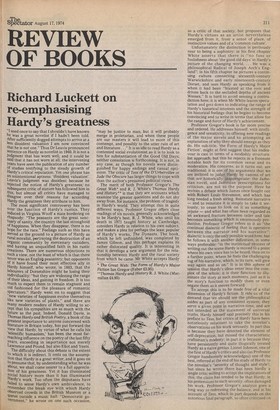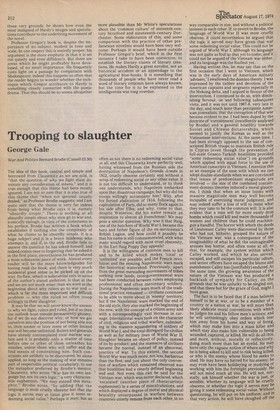REVIEW OF BOOKS
Richard Luckett on re-emphasising Hardy's greatness
"I used once to say that I shouldn't have known he was a great novelist if I hadn't been told. After sufficiently dogged attempts to arrive at a less dissident valuation I am now convinced that he is not one." Thus Dr Leavis pronounced sentence on Hardy as novelist in 1940. It is not a Judgment that has worn well, and it could be said that it has not worn at all: the intervening Years have seen the publication of any number of studies testifying to the steady growth of Hardy's critical reputation. Yet one phrase has an unintentional aptness: 'dissident valuation'. Leavis's judgment was dissident because he rejected the notion of Hardy's greatness; no subsequent critic of stature has followed him in this, but almost all critics have managed to disagree over their reasons for according Hardy the greatness they attribute to him.
The most significant controversy has been over the function of Hardy's rustics. They induced in Virginia Woolf a state bordering on rhapsody: "The peasants are the great sanctuary of sanity, the country the last stronghold of happiness. When they disappear, there is no hope for the race." Feelings such as this have served as the ground to a picture of Hardy as rural moralist, portraying the destruction of an organic community by mercenary outsiders, and having an unqualified faith in his rustic creations. There are numerous objections to such a view, not the least of which is that there never was an Englisb peasantry; but opponents a it have found their most effective ally in Hardy himself, who wrote, in 1883, that the labourers of Dorsetshire might be losing their individuality: "but they are widening the range of their ideas, and gaining in freedom. It is too much to expect them to remain stagnant and old fashioned for the pleasure of romantic .4spectators." Hardy went on to .suggest that '.new varieties of happiness evolve themselves like new varieties of plants," and there are Many modern readers of Hardy willing to accept that his sympathies are as much with the future as the past. Indeed, Donald Davie, in Thomas Hardy and British Poetry, a book of the greatest importance to anyone concerned with literature in Britain today, has put forward the View that Hardy, by virtue of what he calls his scientific humanism,' has been the most farreaching influence on the poetry of the last fifty Years, exceeding in importance not merely Lawrence and Pound, but also Eliot and Yeats.
The difficulty about this debate is the extent to which it is indirect. It rests on the assumption that Hardy is a great writer, and it goes on to presume that, by understanding what he was about, we shall come nearer to a full appreciation of his greatness. Yet it has illuminated social history more than it has illuminated Hardy's work. Too often the disputants have failed to sense Hardy's own ambivalence, to remember the bleak eye with which Hardy Observed crowds in the British Museum or a queue outside a music hall: "Democratic government," he wrote on one such occasion,
"may be justice to man, but it will probably merge in proletarian, and when these people are our masters it will lead to more of this contempt, and possibly to the utter ruin of art and literature ." It is as idle to read Hardy as a contented social evolutionist as it is to look to him for substantiation of the Good Old Days; neither consolation is forthcoming. It is not, in any case, as though his novels were distinguished for happy endings and casual optimism. The critic of Tess of the D'Urbervilles or Jude the Obscure has larger things to cope with than the author's presumed political views.
The merit of both Professor Gregor's The Great Web* and R. J. White's Thomas Hardy and History** is that they are accounts which examine the greater questions and do not shy away from, for instance, the problem of tragedy in Hardy's world. They attempt this in quite different ways. Professor Gregor afters close readings of six novels, generally acknowledged to be Hardy's best. R. J. White, who until his death in 1971 taught history at Cambridge, considers Hardy in relation to his own subject, and makes a plea for perhaps the least popular of Hardy's works, The Dynasts. The book, which he left unfinished, was completed by James Gibson, and this perhaps explains its rather dislocated quality. It is interesting in that it develops a new argument for the relationship between Hardy and the rural society from which he came. Mr White accepts Hardy * The Great Web: The Form of Hardy's Major Fiction Ian Gregor (Faber £3.95) "Thomas Hardy and History R. J. White (Macmillan £4.95) as a critic of that society, but proposes that Hardy's virtues as an artist nevertheless emerged from it, from a sense of place, of instinctive values and of a 'common culture'.
Unfortunately the distinction is perilously near to being a sophistry: in his first chapter White asserts that there is "no fuss or foolishness about 'the good old days' in Hardy's picture of the changing world. ... He was a, philosophical Radical of Joseph Arch's England"; in his fifth chapter he pictures a continuing culture connecting sixteenth-century Warwickshire and early nineteenth-century Dorset, and sees Hardy as speaking from it when it had been "blasted at the root and driven back to the secluded depths of ancient Wessex." It is hard to avoid sensing a contradiction here; it is when Mr White leaves speculation and gets down to indicating the range of Hardy's historical interests and the strength of his historical feelings that he begins to become convincing and to write in terms that allow for the range and force of Hardy's achievement.
Professor Gregor's book is far more precise and ordered. He addresses himself, with intelligence and sensitivity, to offering new readings of the major novels and to attempting an explanation of why they should emerge as they do. His sub-title, 'the Form of Hardy's Major Fiction', might at first suggest that his endeavour is cast in terms of a modishly structuralist approach, but this he rejects in a footnote notable both for its common sense and its moderation. His concerns, as it turns out, are traditional; it is one of his arguments that we are inclined to judge Hardy by canons of art that are historically inappropriate: the Jarhesian novel, and Jamesian prescriptions for criticism, are not to the purpose. Here he revives a debate which James once fought out with Robert Louis Stevenson, and which has long needed a fresh airing. Reinstate narrative — and to reinstate it is simply to take it seriously, to cease to look on it as something jejune — and what has often been regarded as an awkward, fracture between teller and tale becomes something which is enormously productive. Professor Gregor refers to it as "the continual dialectic of feeling that is operative between the narrator and his narrative"; dialectic is only the only possible word here, but he follows it with another definition, in some ways preferable: "in the instinctual process of writing out the scene Hardy is moved to a point where his own voice has to be heard, then on to a further point, where he feels the challenging tug of his narrative, which, in its turn, will give way again and so on." It is in this sphere of tension that Hardy's ideas enter into the complex of the whole; it is their function to illuminate the story at such moments, just as it is the story's function to modify them or even negate them as it moves forward.
To accept this is to be made free of a vital dimension of Hardy's fiction. It rids us of the demand that we should see the philosophical asides as part of any consistent system; they serve a given point in narrative-time, and are not intended as the statement of universal truths. Hardy himself said precisely this in his preface to Tess, but critics of Hardy have been notoriously reluctant to take the novelist's observations on his work seriously. In part this is because they have detected the element of self-deprecation, but missed the characteristic craftsman's modesty; in part it is because they have persistently and quite illogically treated Hardy as a naive genius. Lionel Johnson, one of the first of Hardy's critics and also (as Professor Gregor handsomely acknowledges) one of the best, referred at the end of his study of Hardy to the novelist's "severity of thought and style':, but since he wrote there has been hardly a single critic willing to accept the implications of this; the claim has tended to be that Hardy, in his pretensions to such severity, often damaged his work. Professor Gregor's analysis goes a long way to redressing the balance, and in his account of Tess, which in part depends on the notorious final paragraph, so often criticised on
these very grounds, he shows how even the most maligned of Hardy's images and speculations contribute to the underlying movement of the novel.
Professor Gregor's book is, despite the importance of its subject, modest in tone and scale. In one respect this is entirely proper; his argument is the more emphatic in that it is set out quietly and even diffidently. But there are areas which he might profitably have developed, of no small importance. He frequently casts light on a passage by comparison with Shakespeare; indeed this happens so often that the reader begins to wonder whether the technique which Gregor attributes to Hardy is something closely connected with the poetic drama. That this should be so seems altogether more plausible than Mr White's speculations about the 'common culture' of sixteenth-century Stratford and nineteenth-century Dorchester. Some elaboration of this, and some comparison with the practice of other preJamesian novelists would have been very welcome. Perhaps it would have been outside Professor Gregor's brief, which in the first instance I take to have been corrective; to establish the literary claims of literary creations. He makes Hardy a great novelist, not an historical accident or an appendage to the agricultural blue-books. It is something that thousands of people who have never read a word of literary criticism have always known, but the time for it to be explained to the intelligentsia was long overdue.



































 Previous page
Previous page